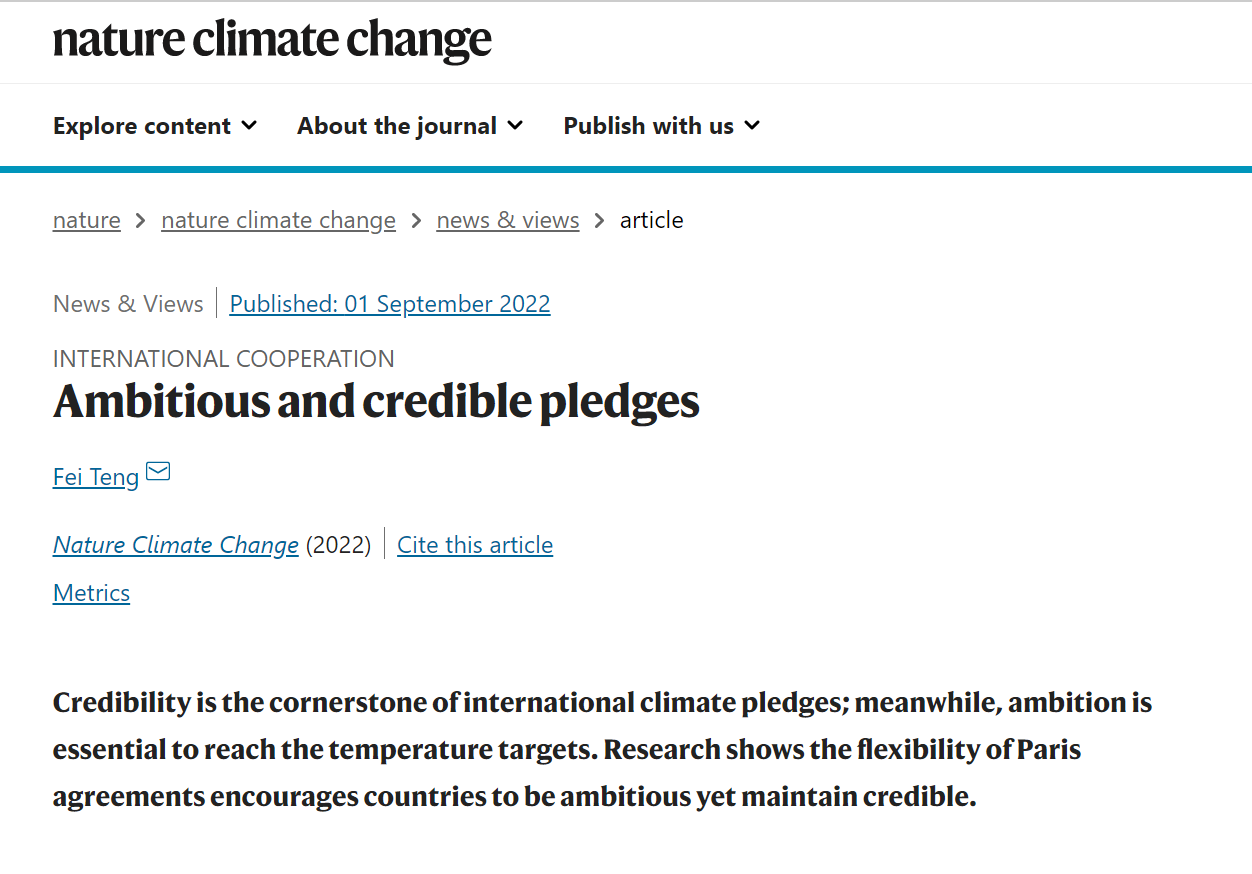Editor's notes
Credibility is the cornerstone of international climate pledges; meanwhile, ambition is essential to reach the temperature targets. Research shows the flexibility of Paris agreements encourages countries to be ambitious yet maintain credible. David Victor, an American academic, and his colleagues have recently taken a closer look at this question, and published their findings in the latest issue of Nature Climate Change. Teng Fei, associate professor and deputy director of the Institute of Energy, Environment and Economy of Tsinghua University, was invited by Nature Climate Change to write the opinion article, which was published on September 1 in the same issue.

Ambitious and credible pledges
(excerpts)
The Paris Agreement sets a global temperature goal aimed at “holding the increase in the global average temperature to well below 2 °C” and “pursu[ing] efforts to limit the temperature increase to 1.5 °C”. To achieve this goal, the Paris Agreement requires countries to submit their emission reduction commitments, so-called Nationally Determined Contributions (NDCs). In addition, countries have also announced net-zero pledges in various international arenas. As of November 2021, 153 countries have submitted NDCs, and more than 140 countries have proposed net-zero pledges. If all NDCs and pledges are implemented fully, global warming could be limited to just below 2 °C. However, since 1972, only one-tenth of major global environmental goals have progressed or been achieved. Furthermore, the implemented national policies are still not sufficient to accomplish pledged NDCs. Therefore, there is a substantial ‘credibility gap’ between intention and action: to what extent will countries comply with their Paris pledges? In this issue of Nature Climate Change, David Victor and colleagues reveal whether — and why — the Paris pledges are credible.
Although simple to ask, it is difficult to measure the ‘credibility’ of countries’ pledges. This is not only because credibility is subjective but also because of the close relationship between credibility and ambitions, defined as the efforts of countries’ pledges. First, ambition is both subjective and relative, depending on factors such as how countries are responsible for historical emissions and whether they have capacity to address climate change. Second, even if ambitions can be measured, most submitted NDCs and net-zero pledges are insubstantial in content without detailed implementation plans, making it difficult to judge credibility. Third, the assessment of credibility requires specific knowledge of the policymaking process: how states organize themselves to cope with climate change and how national governments design, adopt and implement climate policies. In the absence of appropriate measurements of ambition and credibility, expert elicitation becomes a valuable tool. By surveying negotiators and scientists involved in climate conferences, Victor and colleagues show that credibility depends on ambition, and the most ambitious climate pledges are also the most credible ones. Victor and colleagues further show that the credibility of climate pledges depends closely on countries’ institutions and politics.
However, a major limitation is that current research focuses only on emission reduction pledges, and pays little attention to climate finance pledges and the interactions between them. While developed countries pledged US$100 billion in climate finance for developing countries, this has so far not been delivered, and there has been no progress to date on a post-2020 climate finance pledge. The credibility of climate finance pledges will affect not only the efficacy of the Paris Agreement but also the ability of developing countries to achieve their pledges. Victor and colleagues’ results, for example, also show that low per-capita income is associated with high levels of compliance, indicating optimistic expectations of climate finance in low-income countries. In this case, the ambition and credibility of mitigation pledges should not be isolated from finance pledges, as they go hand-in-hand.
This paper’s findings are crucial for achieving the temperature goals in the Paris Agreement.
Teng, F. Ambitious and credible pledges. Nat. Clim. Chang. (2022). https://doi.org/10.1038/s41558-022-01459-6
Victor, D.G., Lumkowsky, M. & Dannenberg, A. Determining the credibility of commitments in international climate policy. Nat. Clim. Chang. (2022). https://doi.org/10.1038/s41558-022-01454-x
Source of cover image:Cristian Storto/Alamy Stock Photo